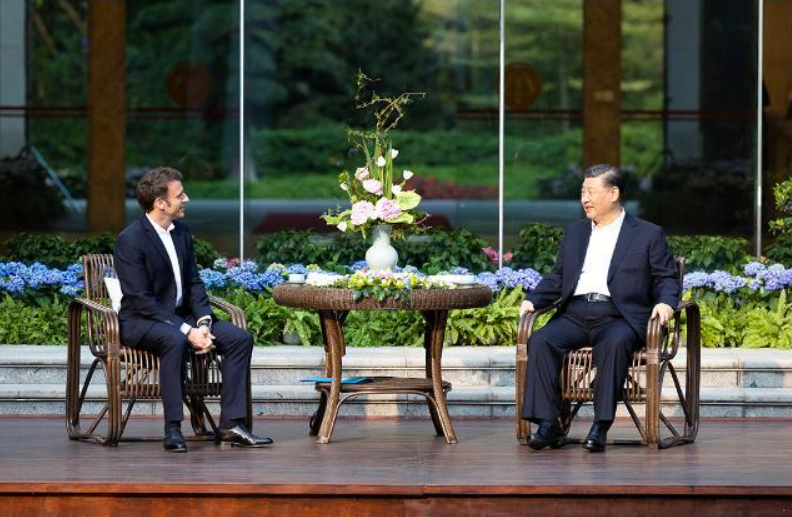
French President Emmanuel Macron recently returned from a state visit to China, during which he had long conversations with his Chinese counterpart. Afterward, the two sides released an extensive joint declaration. The visit not only injected strong new dynamism into China-France relations, but also brought opportunities for China-EU ties.
In an interview following the visit, President Macron said Europe, instead of being dragged into the Taiwan matter or becoming a vassal of the United States, should become a “third pole” globally through the exercise of strategic autonomy. His China trip triggered fierce attacks from some European countries and the U.S., which accused him of being weak on China, undermining a united U.S.-EU stance, and damaging the transatlantic alliance.
Strategic autonomy for the European Union conforms to the bloc’s fundamental interests as an important force in international politics, so why has Macron repeatedly been criticized, especially by some EU member countries? This is because of an increasingly apparent strange circle that has developed in U.S.-Europe relations in recent years: European dissatisfaction with the U.S. gives rise to a motivating force for autonomy, yet Europe quickly chooses and internalizes the U.S. logic and embarks on a path of becoming a U.S. strategic follower.
This strange circle starts with Europe following the U.S. strategically in the security field. America’s hasty military withdrawal from Afghanistan in the summer of 2021 shocked Europe and caused strong dissatisfaction with the administration of newly elected U.S. President Joe Biden.
The war in Afghanistan was the only case in which NATO had activated its collective defense clause. Germany criticized the U.S. for ignoring allies. Italy deemed its participation in the U.S.-led war a “shame”. And even Britain, which claims a “special relationship” with the U.S., accused it of betraying the troops and the Afghan people. Some analysts assumed at the time that the incident would seriously damage U.S.-Europe relations and inspire a renewed European impulse for strategic autonomy.
Because the U.S. defines China as a strategic rival and resorts increasingly to the democracy vs. autocracy polemic, its European allies have begun to accept the logic that the West needs to concentrate on coping with the “China challenge. The Afghan lesson as faded swiftly, and anger over the withdrawal was completely gone by the time of the outbreak of the Ukraine crisis in early 2022. The impulse for strategic autonomy in Europe has given way to the logic that the West must unite under America’s anti-Russia banner to guarantee security.
A similar circle exists in the economic realm. The U.S. has imposed extremely restrictive measures against chip sales to China since autumn 2022 and has asked European nations to follow suit. Although countries like the Netherlands had different arguments in the beginning, the logic of economic security immediately silenced those voices of dissatisfaction.
European economic losses are seen as a necessary cost for protecting Western security and its economy from coercion and threat by authoritarian states. With Europe’s previous “mercantilist” strategic mistake of relying on Russia for energy supplies (as a negative example), this logic warns Europe against making the same mistake in economic ties with China. This seems to have played a significant role in unifying U.S. and European perceptions.
The president of the European Council said the EU won’t decouple from China economically, but it will take measures to lower the risk, which means Europe has essentially accepted the U.S. logic of “friend-shoring” value chains. Similarly, the U.S. Inflation Reduction Act offers preferential treatment to domestic U.S. companies. The EU reportedly intends to file a lawsuit at the WTO against the heavily protectionist industrial policy and may take retaliatory measures. The U.S., meanwhile, has tried to justify its moves with the need to cope with climate change, while outcompeting China in new clean energy technologies.
Following European Commission President Ursula von der Leyen’s March visit to the U.S., the EU appeared to have subscribed to the U.S. logic. Von der Leyen welcomed the act, calling it an investment in the green transition. The subsequent joint statement defined U.S.-EU negotiations on clean energy as coping with non-market policies and behaviors of third parties, especially China.
France is among the first European nations to achieve strategic self-awareness, but strategic autonomy has yet to find wide resonance within the EU. France has a tradition of strategic autonomy, which was obvious in its being the first Western country to establish diplomatic relations with China in 1964. Seven years before the U.S. and other NATO members, in 2014, France withdrew its remaining troops from Afghanistan out of its realization that the issues could not be resolved militarily.
France’s pursuit of strategic autonomy has also been driven by keenly felt pain. The core concern of the U.S.-led AUKUS is arming Australia with nuclear-powered submarines — and that was based on nullifying the France-Australia contract for the vessels. In French eyes, European interests will be ignored under the U.S. grand strategy to preserve its hegemony, and Europe will need to set its own strategic goals so as to not become a U.S. pawn.
Unfortunately the French idea has yet to find sufficient sympathetic response in Europe. Some countries see it as a sign of French strategic blindness; others worry that France is practicing French chauvinism in the name of European autonomy.
It will take time for the strange circle in Europe to clarify. As the cost of following the United States is gradually felt by European nations, conditions for a great European political awakening will finally emerge.
